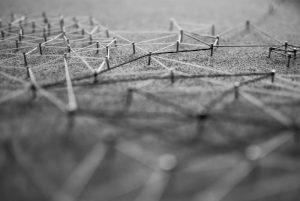The areas of key concern, what we metaphorically refer to as the ‘blades of the FAN”, do not represent a set of discrete problems with discrete solutions. This is because the stress represented by each blade, ecological or socio-economic, is enabled by the complex interdependencies that constitute our globalised civilisation and the ecological niche in which it is embedded and through which it is sustained. Related to this is that each stress arises from something that is to a greater or lesser degree essential to the operation and stability of the rest of the economy and civilisation. Or to put it another way, it requires a very complex civilisation to have such an ecological impact, and that impact is a necessary outcome of its persistence.
As our civilisation has grown in scale and complexity it has locked into place new dependencies and interdependencies which can be seen in the rising expectations that we have become habituated to; in the growing scale and complexities of critical infrastructures; and in the structure and diversity of economies. This has necessitated ever higher operational and maintenance costs as measured by the complexity of goods and services that flow through our economy, which depend ultimately upon the compound growth in energy and material flows.
For example, the green revolution of the 1960’s can be understood as solving the problem of increasing pressure on food production from a growing population, or it can be seen as displacing and ultimately magnifying future risk. Technology was marshalled to create new seed varieties, pesticides, fertilizers, and mechanisation which would accelerate water use and fossil fuel demands. It would lead to greater agricultural greenhouse gas emissions, nitrogen runoff, degraded soils and further pressure on ecosystems. Industrialised agriculture allowed the global population to more than double, while, for example, US household expenditure on food dropped from 17.6% in 1960 to 9.6% in 2007. Farmers as a percentage of population fell dramatically, helping to drive urbanisation. Freed up income meant more to spend on the myriad less essential goods and services, increasing further ecological demands, toxification and waste, but also supporting businesses, employment, public services and debt levels, which taken together are essential for system stability and collective welfare.
The result is that even more people are more vulnerable as their increased welfare demands are dependent upon a less diverse and more fragile resource base. As conventional oil depletes, while water and soil constraints and the effects of climate change grow we are responding to stress on one key FAN blade (say reducing greenhouse gas emissions or fuel constraints with biofuels) by displacing stresses on other key blades that are themselves already under strain (soils, food, water). Our ability to make agriculture more resilient at scale is compromised because societies cannot tolerate the immediate rise in food prices such a transition would entail because it would put even more pressure on our already stressed financial, economic and social systems. Those systems can be expected to come under even more strain as economic growth is compromised by ecological conditions, and the realisation that the promises we have made to the future in the form of debt cannot be sustained.
This example highlights a general feature of our socio-economic and ecological predicament: we can observe not a series of problems and solutions, but rather being locked into a complex web of conditions that are being progressively undermined. One implication of this growing stress is that cross-blade interactions can amplify impacts to society, and this can become more acute as the resilience of civilisation is lost and the ability to adapt (or ‘solve’) problems is weakened. Should critical interdependent systems start to stress more and fail, the complexity and speed of civilizational processes (for example supply-chain replenishment) means large-scale failures could appear quite suddenly and progress rapidly.
To understand how this plays out, and the implications for human welfare and for other life on earth, it is necessary to take a systems perspective that can acknowledge the complexity, yet strives to simplify and clarify what is what is most pertinent, while being conscious of inherent uncertainty.


